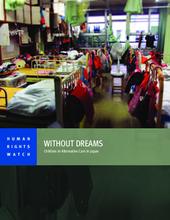This report by Human Rights Watch examines Japan’s alternative care system for children. It describes its organization and processes, presents current data on the use of different forms of alternative care and highlights the problems found in the institutionalization of most children (including infants), as well as abuses that take place in the system. The report also reviews government policies and efforts at reforms, particularly following a number of high profile abuse cases. It also examines the experience of orphans of the 2011 earthquake and tsunami.
Japan’s alternative care system relies on infant care institutions, child care institutions, short-term therapeutic institutions, group homes for independent living, and foster care and family homes. According to the report, 39,047 children were living in alternative care in Japan in 2013. The vast majority—over 85 percent—are placed in government-run institutions, which in 2013 housed just under 34,000 children. The rest receive care from foster parents or are placed in smaller “family homes,” where five to six foster children are cared for in one family. A small number, 303 in 2011, are eventually formally adopted. Worryingly, the report finds that the vast majority of infants (children under 2) who require alternative care in Japan end up in institutions, with only 15 percent placed into foster parent care and the remaining 85 percent admitted to infant care institutions.
Children sent to an institution spend an average of five years there, but as many as 18 percent stay longer than 10 years. The report highlights that although child care institutions were developed after World War II primarily to care for war orphans and street children, most children requiring alternative care today are not orphans, but children who cannot live with their families because of parental abuse or neglect. In addition, children may live within the alternative care system if there is no parent to take care of them because they are deceased or incarcerated, or if their sole remaining parent has a disability so severe they cannot parent. The report also finds that children with disabilities are also over-represented in Japan’s alternative care system. According to the government, approximately a quarter of all children in child care institutions (which are not specialized for children with disabilities) have a disability or medical condition. The report documents instances of abuse in institutional and foster care and the lack of support for independent living for children living the alternative care system. It raises in particular concerns around the practice of infant institutionalisation and the large scale nature of many of the residential care facilities. Human Rights Watch addresses a number of recommendations to the Japanese legislature and responsible social authorities, including the establishment of an independent mechanism to decide on the placement of children in alternative care.

